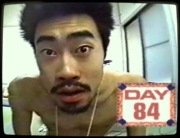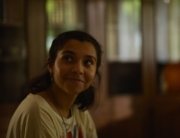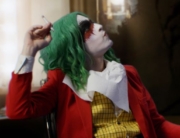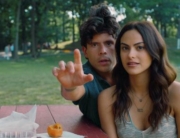
For the most part, viewers will be able to foresee what happens in writer-director Levan Akin’s drama, set in the conservative world of a traditional dance company: a shy, rule-abiding boy meets hotshot rebel boy, and at first, they are rivals and then reluctant friends and finally forbidden lovers. However, because of Akin’s choice to set this age-old queer coming-of-age tale in his native Republic of Georgia, it provides a unique take, and also insight into this country and its society.
Mareb’s family is poor, often with no money to pay the electric bill, and lives in a tenement building in Tbilisi. He has been dancing since he could walk, and his only shot at breaking out of poverty is to become a professional dancer with the National Georgian Ensemble, where his mother and father used to be dancers (the latter is now a washed-up drunk—more on that later). It’s also where Mareb (Levan Gelbakhiani) trains in its school.
He is a gifted dancer, physically, but there is something lacking in his dancing. There’s no passion. He goes through the motions, stomping on the floor as if he thinks acting as the toughest dancer will gain him a spot in the touring company. But he very well may be right. The male dancers are expected to have a militaristic rigidity on stage. This adherence to staccato dance moves may very well put Mareb ahead of his peers at the auditions for the national company.
But in comes the new hotshot dancer, Irakli (Bachi Valishvili), arriving as a replacement dancer. Irakli’s approach is to move in a more naturalistic way than Mareb’s—but he also smiles and finds the joy in the choreography. Everyone takes a shine to him right away. The girls all swoon over him and the boys all want to be his drinking buddy. Mareb keeps Irakli at a distance, but they begin practicing together and instantly Mareb learns to loosen up and even smiles for the first time in the film. So something’s going on.
Is Irakli gay? Is the girlfriend he supposedly has back home even real? Is Mareb figuring out his own attraction to other men for the first time, or is this something he suppressed until he met the spirited and shockingly handsome Irakli? The film spends just the right amount of time building up these questions from Mareb’s point of view before it finally reveals the payoff.
One of the biggest reasons the movie triumphs is because of Gelbakhiani and Valishvili’s on-screen chemistry. They’re both all-in in capturing the aw-shucks adorability of falling in love for the first time. The two are frequently sneaking looks at each other—and it’s totally reciprocated, which makes it all the more heart-fluttering to watch.
There is a subplot about Mareb’s brother, David (Giorgi Tsereteli), who we only see in passing, well, actually passing out, as he’s always coming home inebriated at the crack of dawn and crashing in the bedroom he shares with Mareb. The film has a lot of drinking in it, and when the booze is out, it stays out until the next morning. (This happens so much I kept wondering if this was Akin’s statement on alcoholism in Georgian culture.) The subplot with David ends up coming to full fruition and tying into the main story, as does the story line concerning Mareb’s longtime friend and dance partner, Mary (Ana Javakishvili).
According to the company’s instructor, male roles in Georgian dance used to be more fluid (read: not aggressively masculine), but a change came about 50 years ago. So it’s implied that some shift in gender roles came about culturally and therefore affected the way men are allowed to dance. Yet Mareb’s dance style changes into more of a mix of aggression and softness, a less rigid, more naturalistic take: it becomes an expression of himself. This works as a great metaphor for young queer persons learning to shed whatever performative artifices they have put up to protect themselves from the scrutiny of others.
Sweden’s entry for Best International Feature at the 2019 Academy Awards, And Then We Danced is up there with recent gay classics like Call Me by Your Name, God’s Own Country, and Moonlight.






Leave A Comment